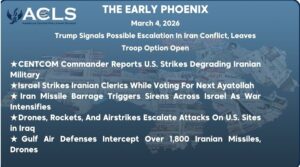Lebanon Hezbollah Front
Israeli Strikes Target Over 3,450 Hezbollah Sites In Syria and Lebanon
The conflict between Israel and Hezbollah remains a major source of volatility, with repercussions that may lead to the full degradation of Hezbollah. While both parties have shown they are prepared to engage in prolonged military conflict, the results of the Israeli strikes have recorded a whopping number of over 3,400 Hezbollah sites.
Today, Monday, the Lebanese Hezbollah movement announced the killing of three of its members in Israeli attacks on the south of the country, near the border with Israel, according to what was reported by the Arab World News Agency Hezbollah stated, via Telegram, that the three dead were from the towns of Aitaroun, Al-Tiri and Yaroun in southern Lebanon.
Recently, Israel targeted over 50 Hezbollah-associated sites in Syria and 3,400 in Lebanon since the Gaza Strip conflict began, as stated by Israeli army spokesperson Daniel Hagari. The strikes aimed at countering Hezbollah’s actions, which were in support of Hamas. Hagari emphasized Israel’s commitment to confronting Hezbollah across the Middle East, mentioning the destruction of 120 border control points, 40 weapon depots, and over 40 command centers, resulting in over 200 fatalities.
The confrontations this weekend began with Lebanese Hezbollah taking the offensive by targeting the Israeli “Khirbet Maar” base near the Lebanese border. Utilizing what they described as “appropriate” weaponry, Hezbollah’s action was part of a series of attacks that included firing two missiles from southern Lebanon at the Israeli military site of Al-Samaqa, located in the occupied Lebanese “Kfar Shuba” hills. Al Jazeera’s correspondent on the ground relayed this development.
The Israeli army’s response to the aggression was swift and pointed. They reported the detection of three missiles that traversed Lebanese territory into the Upper Galilee’s “Baram” and “Zarait” areas, landing in open spaces without causing casualties. Israeli Army Radio further reported the launching of two missiles into an open area in Zarit and an anti-tank missile striking Kibbutz Baram in the Upper Galilee. Adding to the day’s tension, Hezbollah claimed to have targeted Israeli soldiers in the “Yaroun” settlement, causing injuries, and reported bombing the “Even Menachem” settlement with precision.
The Israeli military carried out a series of airstrikes on towns in southern Lebanon, including Aita al-Shaab and Yaroun, as well as the Jabal Balat area. Additionally, Israeli artillery targeted the vicinity of Rashaya al-Fakhar and al-Dhahira towns. The strikes were said to focus on Hezbollah sites within Lebanese territories, including two observation posts and a military command headquarters in Yaroun, alongside attacks on a rocket launcher site and a location from which rockets had been fired into Israel.
Hezbollah’s media outlet, Al-Manar TV, reported Israeli drone and artillery strikes on the town of Yaroun and the outskirts of Rashaya Al-Fakhar. Amidst these hostilities, the Lebanese Amal Movement announced the loss of two of its members in confrontations with the Israeli army in southern Lebanon, raising the death toll to three since the conflict intensified in early October. These fighters were commemorated for fulfilling their national and jihadist duties in defense of Lebanon.
Amos Hochstein informed Israel’s Defense Minister Gallant of receiving the Lebanese government’s approval for a de-escalation proposal, with Hezbollah’s agreement still uncertain. The plan involves two phases: initially, Hezbollah would stop hostilities and retreat 8-10 kilometers north of the Israel border. This move aims to allow Israeli residents to return, supported by the Lebanese army and UNIFIL peacekeeping forces to ensure stability. The second phase involves Israel and Lebanon negotiating land border demarcation, including resolving disputes over 13 points along their boundary, while the U.S. and international community consider economic incentives for Lebanon.
Israeli Foreign Minister Katz warned of limited time for a diplomatic solution in southern Lebanon, amidst conflict with Hezbollah. He told French Minister Ségournet that Israel may take military steps if the violence continues. Lebanese Minister Bou Habib noted the displacement of 100,000 people needing aid, with reports indicating over 90 villages targeted, 83,000 displaced, 686 injured, and 151 dead.



